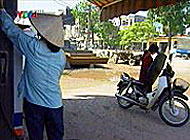Yverdon company gives Vietnamese their own Internet TV

Millions of Vietnamese living outside their homeland now have access to the first internet television station in their native tongue. "Vietnet.tv" is based in the unlikely setting of an industrial estate in Yverdon-les-Bains.
The main aims of Vietnet.tv are to provide a platform for Vietnamese communities around the world to keep in touch with each other, to help maintain the Vietnamese culture, and to provide a link between Vietnam and the diaspora.
“They may have a Swiss passport, or an American passport, or a French passport, but they still feel Vietnamese, and we want to provide them with a way of keeping in touch with Vietnam,” said Anh Tho Andres, who is in charge of marketing and media relations at the station.
Vietnet.tv was launched in cyberspace on the auspicious date of January 24, or the Chinese New Year, and it received 62,000 hits in its first five days on air. Its website has eight themed windows, ranging from arts and culture to tourism, from youth affairs to news, which viewers can access on demand.
“We were responding to the complete lack of Vietnamese language television in Europe,” Blaise Favre, founder and manager of Vietnet.tv told swissinfo.
For financial, technical and practical reasons, Vietnet.tv takes its news bulletins from Vietnam’s TVT4 state television channel. It is perhaps the only television station broadcasting news in Vietnamese and, despite being uncritical of the government, and having something of a northern bias, it does give exiles an up-to-date link with the homeland.
“We are aware of the limitations of the news from Vietnam, and that it may bring back bad memories for those people who were forced to flee the country. But the reality is that the only place to get news of Vietnam is Vietnam,” said Andres, who first came to Switzerland 19 years ago.
In order to broaden the appeal, news bulletins in French and English are also broadcast.
The news only makes up a small part of the site, and Vietnet.tv is in the process of setting up its own production crews inside Vietnam to provide the station with original material.
It is also encouraging Vietnamese around the world to send in their own programmes or short videos: “We would like to present to other Vietnamese people who are an example of integration,” said Andres.
Financial constraints mean Vietnet.tv has to use the Internet rather than satellite as the broadcast medium, but this has had its advantages: “By definition, the Internet is worldwide and we can reach the diaspora all over the world”, said Favre.
He pointed out that television on the Internet is still in its infancy, but constant improvements in software mean the quality is improving rapidly.
Vietnet is a privately funded concern and it is currently courting a number of big companies with a view to sponsoring various elements of the channel. It is mainly targeting firms which have business dealings with Vietnam, including Swiss companies like Swissair, Holderbank and Nestlé.
The Vietnamese diaspora is not a homogenous whole. There have been various waves of emigration, even during the past century.
There were those that came to France and other parts of Europe to study or work during colonial rule, those that left with the French in 1950s, the hundreds of thousands who fled the communists in 1975 or soon after, and those that went abroad to study or work in fellow communist countries in the 1980s.
The diaspora is estimated at around three million people, although this does not include many, like Andres, who have become naturalised in their adoptive country.
Around two million Vietnamese live in the United States and a million in Europe, with the largest populations being in France and the former eastern bloc. Around 8,000 live in Switzerland.
“You can live abroad for decades, but you still somehow want to find your source, Everyone needs a cultural identity and Vietnam has a very rich culture,” Andres said.
The channel’s aim is not only to help older exiles keep in touch with their roots, but also to allow young Vietnamese born outside the country to rediscover their heritage, through cultural documentaries, tourist information, Vietnamese language lessons and even cookery classes.
“When the parents fled Vietnam, their main concern was survival. But as the young Vietnamese people grow up, they will think more about their cultural identity,” said Andres.
Vietnet has also set up a service which aims to reunite friends and relatives who were separated during the upheavals of 1975.
Another project Andres is hoping to get off the ground is to create an archive of Vietnamese literary works: “Many masterpieces were lost during the war. And in recent years, many literary works have been destroyed. We would like to gather these works together and find out what writers have to say about Vietnam.
“Deep down, we would all like to search for our true identity and tell the world who we are. By finding out who we are, we can strengthen our unity and be proud of being Vietnamese,” she says.
by Roy Probert

In compliance with the JTI standards
More: SWI swissinfo.ch certified by the Journalism Trust Initiative
You can find an overview of ongoing debates with our journalists here. Please join us!
If you want to start a conversation about a topic raised in this article or want to report factual errors, email us at english@swissinfo.ch.